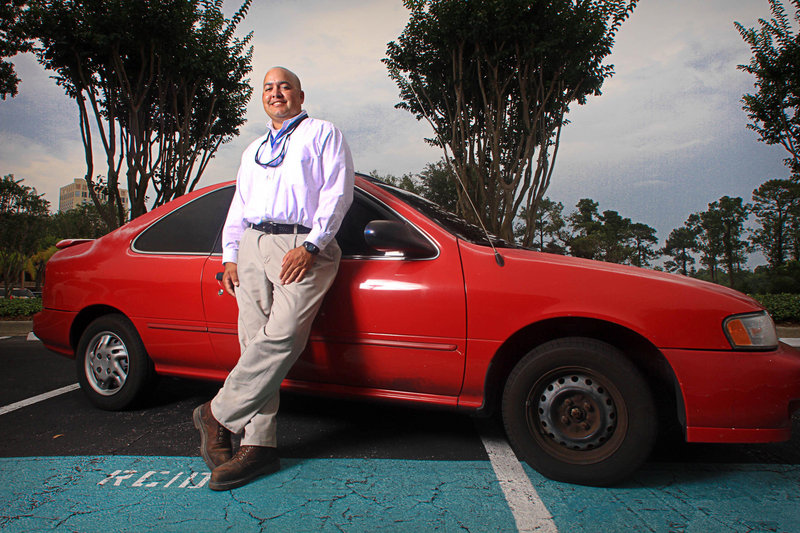ORLANDO, Fla. – It has faded paint, a leaking sunroof and 295,000 miles on the odometer, but Joey Rodriguez doesn’t plan to stop driving his 1995 Nissan 200SX anytime soon.
“My mechanic told me it’s one of the cleanest engines he’s ever seen,” said Rodriguez, a building inspector. “It’s paid off. If I (found) a car with the same kind of gas mileage, I’d end up with another car payment — much more than I want to spend right now.”
Rodriguez, who lives in St. Cloud, Fla., is one of a growing number of Americans hanging on to older cars. The economic downturn, longer loan terms and hardier engines are discouraging drivers from turning in their clunkers.
U.S. cars are now on average about 11 years old, according to automotive-research firm R.L. Polk & Co. Nineteen percent of drivers surveyed by market-research company NPD Group reported owning a vehicle 15 years or older, compared with 14 percent five years ago.
Several things are driving the trend.
During the Great Recession, “consumers found value in keeping their existing car on the road,” said David Portalatin, an industry analyst for NPD Group. “For consumers who don’t have the credit nor the income to finance a new vehicle, it makes a lot of sense to continue to repair these cars and keep them going.”
Brian Weston, 41, of Orlando used to buy new cars and trade them in every few years. But after having to short-sell two houses, the health care-technology consultant has had it with debt. So when Weston needed to buy a vehicle recently, he paid $3,500 for a 2002 Chevrolet Trailblazer that now has 142,000 miles on it. He plans to drive the SUV until it wears out.
“I love driving a car that’s paid off, for the first time since I was 18,” he said. “My neighbor just rolled up in this new Hyundai Sonata, or Elantra, or whatever it is. It’s nice. Is it nice enough for me to finance $25,000 or $30,000? No. I just don’t have that kind of compulsion.”
Used cars have outsold new models for years. But new-vehicle sales took an especially hard hit as the economy soured, plunging 21 percent in 2009 compared with less than a 3 percent decline for used vehicles, which spiked in value as their supply dropped.
New cars have started bouncing back but are “increasingly skewed to high-income households,” said Tom Webb, an economist with Manheim Consulting, which does research on the automobile market. And “all dealers are much more attuned to their used-vehicle operations,” he said.
Longer-term car loans have also discouraged people from trading in their cars earlier. A standard loan used to last three to five years, said Bryan Funke, a director with Polk. Now, that has grown to six years.
Experts also say engines these days last longer, and some manufacturers are offering longer warranties.
“The cars are built so much better now,” said Jim Zych, who owns an auto-repair shop in Forest City, Fla. “They go so much farther than they used to.”
Brakes, mufflers and exhaust systems don’t have to get replaced as often, Zych said.
But like people, cars need more maintenance and repairs as they get older. Richelle White’s strategy for keeping those costs under control is to get her 1995 Pontiac into the shop as soon as she sees a problem.
“I try to pay attention to everything,” said White, 32, of Orlando. “Usually, if you find the problem earlier, it’s way cheaper to fix.”
The Sunfire has many dents on the sides, but “I have no problem driving older cars,” she said.
In some cases, drivers have held on long after the models disappeared. That makes it trickier for mechanics to find parts for vehicles such as Saturns, which General Motors discontinued a couple of years ago.
But in general, many mechanics say the extended life of cars and trucks has been good for business. Revenue at Magic Mechanic in Orlando has increased 10 percent during the past three years, owner Larry Perry said. He attributes that to people coming in for more maintenance to stretch out the lives of their cars. “The repair industry looks like it’s got pretty solid footing for the foreseeable future,” he said.
As the economy revs up, Funke said, eventually “people will forget the pain they had in ’08 and ’09.”
But Weston isn’t so sure. He said he was “scarred” by his short sales and has changed his ways for good.
Send questions/comments to the editors.



Success. Please wait for the page to reload. If the page does not reload within 5 seconds, please refresh the page.
Enter your email and password to access comments.
Hi, to comment on stories you must . This profile is in addition to your subscription and website login.
Already have a commenting profile? .
Invalid username/password.
Please check your email to confirm and complete your registration.
Only subscribers are eligible to post comments. Please subscribe or login first for digital access. Here’s why.
Use the form below to reset your password. When you've submitted your account email, we will send an email with a reset code.